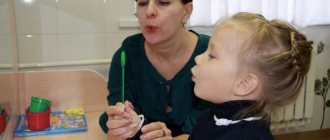Most publications and articles devoted to the formation of speech in children under 3 years of age talk about certain norms for the development of this skill, which is important for any person. But sometimes it happens that a child begins to talk later than his peers. Let's figure out why some children begin to speak later than their peers, how to help them acquire this skill, and in what cases urgent measures need to be taken.
- Is it true that boys start talking later and what is the reason for this?
- Reasons why a child does not start talking Social reasons
- Biological causes of speech delay
- Exercises and activities for speech development
Is it true that boys start talking later? And what is this associated with?
A similar question comes up on many forums. Mothers of boys are interested in the reasons why their children begin to speak later than their girls the same age.
If we consider this issue from a biological point of view, it comes from the peculiarities of the formation of the brain of representatives of different sexes. The human brain consists of two hemispheres, each of which is responsible for specific functions. But for the uniform development of speech and other skills, it is necessary that both parts exchange information with each other. The path for information between the two halves of the brain is a bundle of nerve fibers, which is initially larger in girls than in boys. Because of this, some males experience a lag behind the general norms, on average up to 4 months.
This is not scary and does not indicate any deviations. This is how nature ordered it. This difference is noticeable only in the first three years of life. Subsequently, in the absence of negative factors, boys develop on equal terms with girls.
In addition to biological features, the formation of speech can be influenced by other factors that affect children in the same way.
How does speech normally develop?
As a rule, by the first year a child has about 10 words in his dictionary.
By the age of two, there should be the simplest phrases of two words: mom give, mom go, who came, etc.
It is important to remember that boys begin to speak later than girls, closer to 2.5-3 years
By the age of three, adjectives and simple prepositions appear in speech. The child's speech becomes more understandable to adults. The sounds S, Z, C appear in sound pronunciation, and children begin to use a phrase of three to four words.
At the age of 4-5 years, the sounds of the upper rise appear: Sh, Zh, Ch. The so-called “word creativity” appears in the speech of children.
At 5-6 years old, the sounds L and R are formed. At this age, the child correctly pronounces all sounds in speech. In his stories he uses both compound and complex sentences.
Reasons why a child does not start talking
Thinking about the timeliness of the appearance of speech, noticing some lags from the norms, parents begin to look for reasons. Finding and correcting the factors influencing the development of speech skills is an important step in creating favorable conditions. The reasons for a child’s lack of timely speech can be social and biological. If social factors can be changed, then additional medical help is often needed to eliminate biological factors.
Social reasons
- Unfavorable environment for the development of speech skills . This reason is typical for families where parents have little communication with their child and with each other. Contact with the baby occurs from case to case and is aimed only at eliminating basic needs. The baby does not develop an understanding of the need to master the language. To correct the situation, it is necessary to reconsider the relationship in the family between the spouses and the child. In most cases, it is simply necessary to enrich speech directed directly at the child with poetic forms, discussion of the surrounding world and events;
- Lack of demand for speech when the baby is sick . If the baby is often sick, is regularly isolated from the outside world due to poor health, he lacks movement and variety in actions. Parents trying to resolve a difficult situation sometimes make a mistake. In an effort to protect the baby from difficulties, they do not allow him to explore the space around him, they try to predict every desire. In such conditions, natural curiosity fades away, and the need to develop speech disappears;
- Cruel treatment . Children react very strongly to physical and psychological violence and withdraw into themselves. Most often, such antisocial treatment of a child is accompanied by a complete lack of pedagogical work and requires urgent outside intervention;
- Pedagogical neglect. Some parents shift the role in raising and educating the child to future educators and teachers. Relying on their natural ability to master the world around them, they do not make any attempts to educate and develop their own children. Most often you can hear that the baby will learn the necessary things when he goes to kindergarten or school, where teachers will work with him. Errors in judgment are sometimes formed on the basis of a lack of general knowledge about approaches to teaching very young children, a reluctance to understand how to help them learn;
- Bilingualism . Children who are taught two or more languages from a young age, without using the right pedagogical technologies, show a tendency to slowly master the necessary speech skills, as a result of overload or difficulty in perceiving the proposed material. The success of bilingual education is based on conventional methods of speech development, which is not always taken into account by parents;
- Emotional stress . Sometimes the cause of speech delay can be an event or a series of events that cause fear, emotional distress, subconscious fears, etc. in the child. Correction of the speed of speech development in such children should occur with the help of a specialist psychologist and speech therapist. First of all, it is necessary to overcome subconscious blocking and fears;
- Hyperprotection . A number of adults, trying to help their child in everything, sometimes go too far and begin to live for the little one. This behavior leads to a general slowdown in development, since the baby does not need to make efforts to achieve what he wants. The desire to help in everything, predict desires and indulge whims, in addition to delayed development, threatens with more complex mental disorders: the formation of an incorrect picture of the world, lack of motivation in learning, achieving success in life;
- Overloaded information environment . If a baby is surrounded by an environment constantly loaded with various information (TV, radio), then gradually he will wean himself from perceiving the sounds he hears and filtering the world around him. He withdraws, withdraws. To concentrate on a specific action, he has to turn off the perception of the world around him and spend extra energy for a quality activity.
Biological causes of speech delay
- Heredity . Children in most cases, in the absence of other reasons, develop speech following the genetically determined speed of their parents. If the father or mother spoke late, then there is a high probability that the child will be slightly behind developmental norms. This is not a pathology and does not require intervention, help the baby master difficult moments for him, and when the time comes, everything will return to normal;
- Features of hearing, hearing loss . Unfortunately, more and more children from birth have various hearing or ear canal pathologies. They cannot always be identified immediately, so it is important to closely monitor the development of a baby’s speech abilities up to one year; at the slightest suspicion of a reduced reaction to sounds, you should contact a pediatrician;
- Consequence of illness or injury at an early age. Speech development delays occur after previous or congenital diseases at an early age that put a strain on or affect the development of the brain. The solution to the issue of restoring the necessary functions lies in the field of medicine;
- Mother's illness during pregnancy. The child’s ability to timely master his native speech is affected by complex diseases and colds, which were treated with the use of medications. In most cases, the mother is warned about possible consequences and makes appropriate notes in the baby’s discharge;
- General developmental delay. Sometimes delays in speech development are accompanied by neurological diseases or difficulties in mastering other skills. Tactics for working with such children are developed together with pediatricians, psychologists and other specialists.
It is important to identify the cause of the delay as early as possible in order to take the necessary measures in a timely manner or seek help from a pediatrician or speech therapist. Attentive attitude and support in overcoming difficult moments help to correct most problems.
Can a child become silent due to vaccinations?
Many parents ask whether vaccinations can really lead to a sharp setback in psycho-speech and speech development. In fact, modern science does not know of a single reliable study proving that vaccines cause such harm to a child’s development. The disappearance of speech can be caused by failure to comply with the conditions of vaccination: only a healthy child with a strong immune system and no neurological pathologies can be vaccinated. At risk are children who have experienced oxygen starvation during pregnancy and childbirth, have organic defects of the central nervous system and heart, severe diseases of the respiratory system, suffer from atopic dermatitis, as well as children who often suffer from colds. Before each vaccination, be sure to have your child thoroughly examined by a doctor you trust.
In any case, when a child suddenly becomes silent, it is better to play it safe and at least show him to a pediatrician in order to rule out serious pathologies and not waste time. Before your visit, analyze what could have caused the loss of speech; this will help the doctor quickly make the correct diagnosis and provide the necessary assistance.
What to do if your child is silent: tips and recommendations for action
The formation of speech occurs individually for each child, depending on biological and social characteristics.
Always remember that your child is special, different from others externally, internally, in the speed of development and acquisition of skills. It is impossible for differences from established indicators to become the reason for your anger, nervousness or negative attitude towards your child.
The main recommendation for stimulating speech function is constant conversation directed at the child. You should not talk next to him, but directly with him. From the moment of birth, talk to your baby, respond to his cooing, babbling, and smiles. Tell your growing child about the things that surround him, the actions he performs, use more adverbs and adjectives. The speed of speech development depends on the number of different words heard by the child.
Important for the formation of a correct and rich language is reading and discussing the plot, learning poetic forms and songs. With the arrival of a child in the family, watch your own words and sentences, showing an example of correct pronunciation, use of complex words, and composition of sentences. It is not recommended to distort words, use incorrect forms, or lisp. Parasitic words and the use of swear words have a negative impact. Try so that when your child tries to imitate you, he sees only a good example.
If it seems to you that your baby is lagging behind in the development of speaking skills, then try using various exercises for stimulation, take him to a neurologist and speech therapist.
Using exercises for speech development is recommended for all parents who want to enrich and saturate their child’s vocabulary with new and beautiful words.
Exercises and activities for speech development
What I see. The exercise consists of stimulating the passive vocabulary and adding new words. Can be used from 6 months. The essence is the desire to talk about simple actions with toys, to indicate everything that happens using words. The adult sits down close to the baby and begins to play or handle objects. Using simple sentences, he talks about his actions:
This is a big blue cube. I place it on the big red cube. It turns out to be a turret. Beautiful, big turret. Now I will destroy it. Look, the tower has fallen.
By describing simple actions in words, pointing to the objects in question, connections are established between the highlighted objects and their designation orally. The use of various adjectives and adverbs makes it possible to remember different characteristics for actions.
What are you doing. The essence of the exercise is to verbally convey all the actions and sensations of the baby. Can be used from 6 months. An adult, following his child, tells him about the actions and objects encountered along the way on behalf of the baby:
Vanya walks along the carpet. The carpet is soft, red and large. Vanya sees a blue car. It is small, light, smooth.
I don't understand. It is used after 1.5 years, when the child already knows a large number of words, but is too lazy to pronounce them, using simple substitutes or gestures. The point is to deliberately avoid understanding the baby’s request. If he asks for an object without using a word designating it, then the adult pretends that he does not understand the request addressed to him, either hands over the wrong object or speaks of misunderstanding. The baby's first reaction will be indignation, but this stimulates the need to name the right objects using the right words. This exercise is used not only for objects, but also for actions.
Choose. The exercise is aimed at stimulating speech activity, developing the ability to perform thoughtful actions, and motivation. Used from 1.5 years. The point is to provide the opportunity to choose the most suitable one among the designated number of options. Offer a choice of clothes for going outside, a toy for an activity, a dish for food. After thinking about your words, the baby will be forced to say what he needs at the moment;
Let's imagine. From the age of 2, it is good to use tasks for speech development in which the child must use his imagination. Invite him to mentally replace the proposed objects with others, play with them, based on his experience. Let the ball be the apple that you feed the doll, the cubes will become the wall of the house. It’s good to offer to play outdoor games, giving the opportunity to imagine yourself as a hero or object. Tell him that you and him are a plane flying to the base, bunnies jumping through the forest, etc. Stimulation of fantasy will provide the necessary motivation for speech development.
Games with dolls, role-playing activities. A child’s ability to talk with other people plays a significant role. Role-playing games train this skill well. Use your baby's favorite toys to start a dialogue with him, ask questions that he can answer. It is good to use this type of exercise during regular play, exercise or on the road.
Singing and dancing. Musical development has a positive effect on the formation of correct speech. Children happily sing along to familiar songs and move to dance tunes. Gradually, a desire appears not only to sing individual words or the last line, but also to sing small songs in their entirety. The best option would be to perform the song together with the baby and pronounce all the words in the correct form. If, while reproducing the text from memory, your child uses incorrect forms of words or confuses syllables, support him and sing with him, but mark with your voice the places where he has errors.
Mirror. To correct incorrect pronunciation, exercises with a mirror are used. Seeing his and your reflection, the baby will have fun and strive to repeat the exercises he likes most. Thus, it is gradually recommended to accustom one to articulatory gymnastics, which helps correct speech deficiencies, make it cleaner and more understandable.
These simple exercises will allow you to help your child develop his speech skills, enrich his speech and make games interesting and vibrant.








